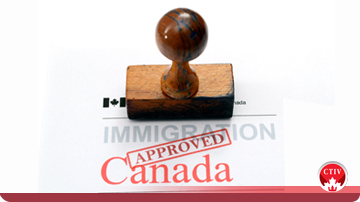To work in Canada on a temporary basis, foreign workers need the work permit. Immigration, Refugees and Citizenship Canada (IRCC) approve Canada work visas under the Temporary Foreign Worker Program (TFWP).
Changes to open work permits for family members of temporary residents
Briefing Document: Changes to Open Work Permits for Family Members of Temporary Residents in Canada
Review of Policy Changes regarding Open Work Permits for Family Members of International Students and Foreign Workers in Canada
Source: Excerpts from "Changes to open work permits for family members of temporary residents - Canada.ca" (Dated: January 14, 2025)
1. Executive Summary:
This document outlines significant changes to Canada’s open work permit (OWP) eligibility for family members of international students and foreign workers, effective January 21, 2025. These changes, implemented by Immigration, Refugees and Citizenship Canada (IRCC), are intended to strengthen the integrity of temporary resident programs while aligning with Canada's economic and labour market needs. The primary shift involves restricting OWP eligibility to spouses only, and introducing stricter criteria regarding the type of program the international student is undertaking, and the skill level and remaining duration of the foreign worker's work permit. Dependent children are no longer eligible for family OWPs.
2. Key Changes and Implications:
3. Key Quotes from Source:
4. Analysis and Conclusion:
These changes represent a tightening of Canada’s open work permit system for family members of temporary residents. The move targets the spouses of specific international student cohorts and foreign workers in higher-skilled occupations or in sectors with identified labour shortages. The removal of dependent children’s eligibility will likely have a significant impact on families. This policy shift appears aimed at better aligning the temporary foreign worker program with Canada's economic and labour market needs, while also addressing concerns about potential abuse or misuse of the OWP system.
The details of specific TEER 2 and 3 occupations that will be eligible will be crucial for stakeholders to understand the impact. This update signals a more targeted approach to managing temporary immigration and its effects on the Canadian economy.
5. Next Steps:
What impact will these changes have on Canada's immigration system?
The changes to open work permit (OWP) eligibility for family members of temporary residents are intended to strengthen the integrity and quality of Canada's temporary resident programs while supporting the country's economic goals and labour market needs1. The changes will affect who is eligible for a family OWP.
Here's a breakdown of the impact:
• Reduced eligibility for family members: Only spouses of certain international students and foreign workers will be able to apply for a family OWP2. Dependent children of foreign workers will no longer be eligible.
• Specific criteria for spouses of international students: Family OWPs will be limited to spouses of international students enrolled in master's programs (16 months or longer), doctoral programs, or select professional and eligible programs.
• Specific criteria for spouses of foreign workers: Family OWPs will be limited to spouses of foreign workers employed in TEER 0 or 1 occupations, or select TEER 2 or 3 occupations in sectors with labour shortages or linked to government priorities3. These sectors include natural and applied sciences, construction, health care, natural resources, education, sports and military sectors. A full list will be available on January 21, 20253. Furthermore, the foreign worker must have at least 16 months remaining on their work permit when their spouse applies for the OWP.
• Existing OWPs remain valid: OWPs approved under the previous measures that have not expired will remain valid.
• Renewal options: In-Canada family members can apply to renew their work permit if they are applying under the same criteria as their current work permit and the requested renewal duration matches that of the principal applicant's study or work permit.
• Exemptions: Spouses of workers covered by free-trade agreements and those transitioning to permanent residence will not be impacted by these changes.
• Alternative work permit options: Family members who no longer qualify for a family OWP can apply for any other type of work permit they are eligible for under Canada's work permit programs.
In summary, these changes aim to be more selective in granting open work permits to family members, focusing on those most likely to support Canada's economic and labour market needs. The changes will limit the number of eligible family members, but also provide pathways for those who are ineligible for family OWPs to apply for other work permits.
What categories of international students' spouses are eligible for OWPs?
Based on the provided sources, only spouses of certain international students will be eligible to apply for a family open work permit (OWP)1. Specifically, these include spouses of international students who are enrolled in:
• Master’s programs that are 16 months or longer
• Doctoral programs
• Select professional and eligible programs
It is important to note that these changes to OWP eligibility are effective as of January 21, 20251. Spouses of students in programs other than those listed above will not be eligible for a family OWP.
Unlock Canada’s New Opportunities with Sanjay Prasher, Immigration Consultant
Effective January 21, 2025, Canada’s Open Work Permit (OWP) rules for family members of temporary residents are changing, creating both challenges and opportunities. Spouses of international students and foreign workers will still qualify for OWPs, but with stricter criteria—only tied to specific programs and occupations. Dependent children, however, will no longer be eligible.
Navigating these updates can be overwhelming, but Sanjay Prasher, a trusted immigration consultant based in North York, Toronto, is here to help. With expertise in adapting to evolving policies, Sanjay ensures a tailored approach for families aiming to secure their future in Canada.
Don’t let these changes derail your plans. Call Sanjay today at +1 416-857-0100 for a free consultation and chart a path that aligns with Canada’s new immigration landscape. Act now to make informed decisions for your family’s future!

To work in Canada on a temporary basis, foreign workers need the work permit. Immigration, Refugees and Citizenship Canada (IRCC) approve Canada work visas under the Temporary Foreign Worker Program (TFWP).

Canada is well known for its spacious countryside, cultural diversity, superior education, healthcare system and economic stability, has one of the highest immigration rates and is considered one of the most popular destinations for Immigrants.